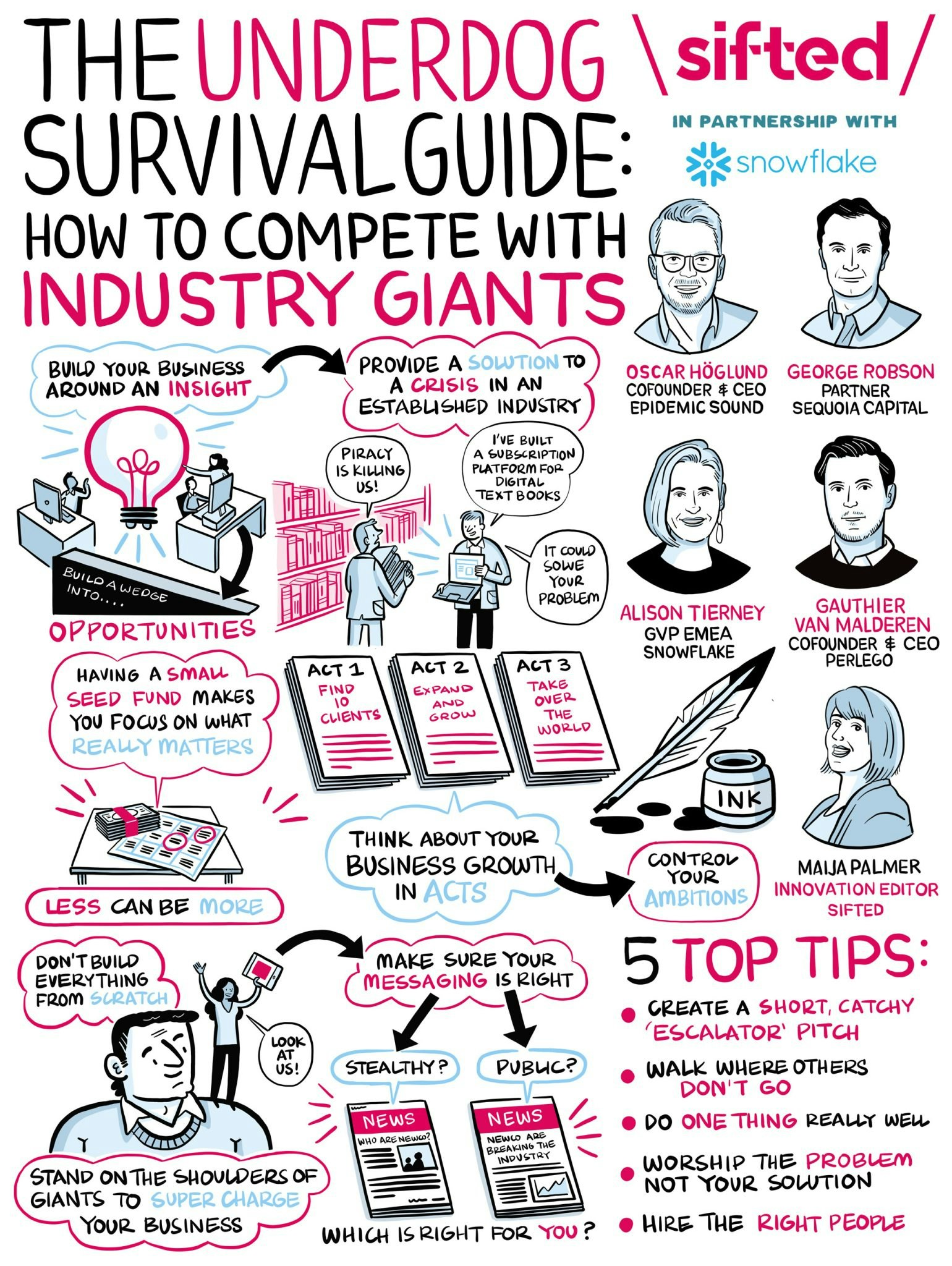Building a startup is hard — and it gets even harder when you’re up against household names that have way more funding and customers.
In the UK, 20% of startups fail in their first year while 60% of businesses fold within three years — so how can startups take on the competition and ensure their survival?
In our recent Sifted Talks we asked our panel for their top tips for competing as David in a market filled with Goliaths. Our experts were:
- Alison Tierney, GVP EMEA, Snowflake, a a modern data platform
- Oscar Höglund, cofounder and CEO, Epidemic Sound, a Swedish company providing royalty free music
- George Robson, partner, Sequoia Capital, an American venture capital firm
- Gauthier Van Malderen, cofounder and CEO, Perlego, a subscription-based online library for students and academics
Here’s what we learned.

1/ “Walk where no one else can follow”
While some startups can find a niche and own it, others have to compete with bigger companies offering a very similar service or product.
Robson said the early days of being a seed company are about finding your unique value proposition, or how you’re different and better than your competitors. He added that American and western European firms used to build their offering in their own countries first and then scale into other markets with relative ease, but now they’re having to compete with competitive local businesses in new markets.
Try and walk where no one else can follow. It’s wise to see what the competition is doing, but to fundamentally understand what they’re doing well and what they can't do is incredibly important… If you understand where your competitor's pain points are, you can move into areas where no one else can follow” — Höglund, Epidemic Sound
2/ Hire “great” talent
A great company starts and ends with great talent. But “great” can look different to different companies — and as Europe’s war for talent rages on, expanding what you value in an employee can give you a leg up.
The right people will provide a startup with a competitive edge — no matter how much experience they have on paper. Van Malderen said he looks most for people who are eager to learn and open to new ways of doing things. When it was first starting out, Perlego hired people at the beginning of their careers and brought in more experienced advisers when needed, adding that it’s important for founders to make employees feel like they have ownership of the company.
Robson said it’s important that employees understand the startup’s mission; he recommends employees write down their own unique company culture and values, so this can act as their North Star as the workforce increases.
Someone who has been in the industry for 30 years maybe doesn't have that hunger and drive and doesn't want to work relentlessly to drive the mission of Snowflake forward. We consistently look for aptitude and people ahead of their own curve and put them in jobs that they can grow into” — Tierney, Snowflake
3/ Be loud
When you have a great product, people should know about it — and media is a great channel for that.
Epidemic Sound and Perlego took different approaches to getting their message into the media. Van Malderen said he was visible and vocal from the start, positioning the startup as an industry disrupter.
Höglund said he started out in “stealth mode” — he kept his head down, concentrated on building his business and didn’t talk about it. But, he warned, when you don’t tell your story, people will hijack it on your behalf; he also said it was painful seeing the company threatened by people making things up about Epidemic Sound, and not knowing if he should fight back.
Sequoia Capital generally recommends companies not publicise themselves in the traditional press too early, but Robson said working with specialist blogs and media outlets can help position themselves as thought leaders in their niche.
As an early stage company, you generally only have one shot — you don't have the collateral you’ve built up with the media, because you’re a newly formed business. Think deeply about who you’re trying to address with this particular activity. Is it customers, is it employees or is it partners in the market?” — Robson, Sequoia Capital
4/ No money, no problem
It’s tempting to go out and secure a huge amount of funding, but sometimes a shoestring budget can actually work to a startup’s advantage.
Höglund said Epidemic Sound had to finance itself for its first five years, forcing it to really listen to customers and build a product that directly solved their problems.
When Perlego first tried to get funding, edtech was a small market with very little funding. On paper, Van Malderen said it made no sense for others to invest in his startup as he had no experience building a business or in the publishing industry. This forced a very steep learning curve, that wound up being incredibly valuable to Perlego’s growth.
Having not too much money makes you focus and really build on what’s important first… My perception about company building is making lots of mistakes very fast, learning from them and making [the mistakes] as cheaply as possible” — Van Malderen, Perlego
 5/ Avoid these mistakes
5/ Avoid these mistakes
As the underdog, startups can be a bit more cheeky — but some rules should never be broken.
The panel ended the discussion by sharing the mistakes they would never repeat. Tierney said when Snowflake first came to Europe, it hired too many people too fast. She says they should’ve taken a step back and looked at who they really needed to function in the market.
Speaking from experience, Van Malderen said it’s important not to cut corners, as it could harm the business in the long term. In a startup there will be short-term wins — but founders need to spend money on the things that matter or they might live to regret it.
You should really work hard not to fall in love with your own solutions. You can never compromise around being customer-centric. You need to worship the problems and like your solutions, not the other way around. You need to really focus on the problems you are solving” — Höglund, Epidemic Sound
Liked this and want more? You can watch the full Sifted Talks here:



